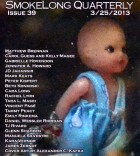Where did the idea for this story start? With the child’s death or with the disasters?
Randomly enough, I found the inspiration for this story at a flea market in Bowling Green, Ohio. Someone was selling a box of old photographs, almost all of which featured some kind of disaster—derailed trains, sinking barges, wooden airplanes smashed to pieces. They were awful and incredible and unsettling, and I would have bought the entire box if I’d had the money, but I decided to write a story about them instead. All the other details—the child’s death, the mail correspondence, the woman’s self-destruction—came later.
I’m dying to know: When you wrote this story, how did you imagine “Your Hindenburg,” the man on the other end of the letters? We know hints of the woman’s back story, but we know almost nothing about him.
I like that you call him “Your Hindenburg.” In my mind, he’s more of a nameless entity, a force of chaos and ruin. (Although I do know that he’s very tall and wears a hat.) I conceived of his character as one whose aims run parallel to the woman’s: Both of them have experienced terrible things, but whereas the woman wants to be destroyed, the man wants to communicate his disasters with other people and make them share in his suffering. I’ll confess that I didn’t want to know what kind of disasters the man had actually experienced; it was enough for me to know that he was a deeply wounded character.
What, for you, is the most important element of flash fiction?
For me, nearly every piece of good flash fiction has intensity. In longer forms—novels especially—there is room for looseness, for long and relaxed scenes with plenty of backstory. In flash, though, you only have the reader’s attention for a few minutes, and you have to make the most of it by using sharp, precise language and quick scenes with significant consequence. I’ve found that flash can allow you to skimp on things like setting, dialogue, and even character (which is great, because I struggle with some of these), but the piece has to sustain its intensity from the first word to the last or it won’t be successful.
What are you working on now?
This spring I’m trying to finish a draft of my novel-in-progress, a fictionalized account of two nineteenth-century European mathematicians. Math is a somewhat unlikely topic for a novel (uninteresting, some people would say), but the lives of the two men I’m writing about are brimming with genius and conflict and creativity, and writing about them has been fascinating.
I’m also working on a number of short stories in which incorporeal things take on physical attributes. There’s an apocalypse where light eats buildings, a museum where languages are collected in jars and vases, a city where color peels away from objects and floats off into the stratosphere—all sorts of surreal stuff. Balancing multiple projects feels a little like juggling blindfolded, but it keeps me busy.



 The core workshop of SmokeLong Fitness is all in writing, so you can take part from anywhere at anytime. We are excited about creating a supportive, consistent and structured environment for flash writers to work on their craft in a community. We are thrilled and proud to say that our workshop participants have won, placed, or been listed in every major flash competition. Community works.
The core workshop of SmokeLong Fitness is all in writing, so you can take part from anywhere at anytime. We are excited about creating a supportive, consistent and structured environment for flash writers to work on their craft in a community. We are thrilled and proud to say that our workshop participants have won, placed, or been listed in every major flash competition. Community works.